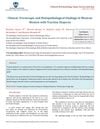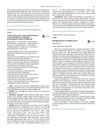 86 citations,
August 2014 in “Journal of The American Academy of Dermatology”
86 citations,
August 2014 in “Journal of The American Academy of Dermatology” To diagnose hair loss, use a systematic approach including history, exams, and tests.
 28 citations,
April 2013 in “Fertility and Sterility”
28 citations,
April 2013 in “Fertility and Sterility” Caucasian and Asian women with PCOS generally show similar symptoms, except Asian women have less chest hair.
 15 citations,
November 2012 in “International Journal of Dermatology”
15 citations,
November 2012 in “International Journal of Dermatology” The conclusion is that hair loss from CCCA may be genetic and not solely caused by hair grooming practices.
 10 citations,
May 2015 in “International Journal of Women's Dermatology”
10 citations,
May 2015 in “International Journal of Women's Dermatology” New treatments for skin and hair disorders in women of color address unique biological differences and include specific acne medications, sunscreens, skin lighteners, and hair care adjustments.
 January 2020 in “Clinical dermatology open access journal”
January 2020 in “Clinical dermatology open access journal” Changing certain hairstyles can prevent worsening hair loss in Mexican women.
 105 citations,
April 2004 in “Dermatologic Therapy”
105 citations,
April 2004 in “Dermatologic Therapy” The document concludes that proper diagnosis and a combination of medical, hair-care, and surgical treatments are important for managing alopecia in black women.
 43 citations,
July 2012 in “Molecular human reproduction”
43 citations,
July 2012 in “Molecular human reproduction” Certain metabolites are lower in women with PCOS and could be potential markers for the condition.
 15 citations,
January 2019 in “International Journal of Women's Dermatology”
15 citations,
January 2019 in “International Journal of Women's Dermatology” Early treatment helps stop hair loss in women of color.
 3 citations,
January 2019 in “Skin Research and Technology”
3 citations,
January 2019 in “Skin Research and Technology” Frequent use of hair straighteners can cause hair loss similar to scarring alopecia in young Turkish women.
 2 citations,
May 2017 in “Maturitas”
2 citations,
May 2017 in “Maturitas” Women with premature ovarian insufficiency have a worse cardiovascular risk profile than premenopausal women.
 815 citations,
April 2010 in “The Journal of Clinical Endocrinology & Metabolism”
815 citations,
April 2010 in “The Journal of Clinical Endocrinology & Metabolism” Women with PCOS should be screened for heart disease risk and manage their health to prevent it.
 30 citations,
March 2010 in “European Journal of Dermatology”
30 citations,
March 2010 in “European Journal of Dermatology” Hair loss in elderly women is often caused by various factors, including hormonal changes after menopause.
 March 2024 in “Frontiers in reproductive health”
March 2024 in “Frontiers in reproductive health” Women of color in Northern Manhattan view hair care as important to their identity and culture, and education on harmful chemicals in hair products is needed.
 October 2017 in “Iranian Journal of Dermatology”
October 2017 in “Iranian Journal of Dermatology” Clinical exams are good for diagnosing some women's hair loss, but lab tests aren't always needed.
 18 citations,
March 2014 in “Current Pharmaceutical Biotechnology”
18 citations,
March 2014 in “Current Pharmaceutical Biotechnology” Metformin helps regulate menstrual cycles, induce ovulation, and improve pregnancy outcomes in women with PCOS.
52 citations,
April 2016 in “Journal of the American Academy of Dermatology” Certain black hairstyling practices increase the risk of traction alopecia, requiring better management and education.
 28 citations,
August 2009 in “Nursing for Women's Health”
28 citations,
August 2009 in “Nursing for Women's Health” Cognitive behavioral strategies help women with PCOS make lifestyle changes to improve their health.
 27 citations,
September 2017 in “Journal of Investigative Dermatology Symposium Proceedings”
27 citations,
September 2017 in “Journal of Investigative Dermatology Symposium Proceedings” Hair loss in black women needs more research, early intervention, and community education.
 73 citations,
November 2005 in “Journal of Investigative Dermatology Symposium Proceedings”
73 citations,
November 2005 in “Journal of Investigative Dermatology Symposium Proceedings” Some women with common hair loss may develop permanent hair loss.
 51 citations,
February 2006 in “Clinics in Dermatology”
51 citations,
February 2006 in “Clinics in Dermatology” Pregnant women often experience skin and hair changes, with over half getting stretch marks and pigment changes, and should be cautious with cosmetic procedures due to potential risks.
 16 citations,
June 2008 in “Springer eBooks”
16 citations,
June 2008 in “Springer eBooks” Over 50% of women over 50 experience hair loss, with minoxidil being the only proven effective treatment.
 286 citations,
January 2009 in “Human Reproduction Update”
286 citations,
January 2009 in “Human Reproduction Update” Women with the NIH type of PCOS have more obesity and higher risk of diabetes and heart disease than those with other types of PCOS.
 57 citations,
September 2005 in “International Journal of Dermatology”
57 citations,
September 2005 in “International Journal of Dermatology” Frequent use of chemical hair relaxants is linked to increased scarring hair loss in Nigerian women.
 43 citations,
September 2012 in “International Journal of Dermatology”
43 citations,
September 2012 in “International Journal of Dermatology” Hormonal therapies are safe and effective for treating adult women's acne.
 6 citations,
September 2005 in “Expert Opinion on Pharmacotherapy”
6 citations,
September 2005 in “Expert Opinion on Pharmacotherapy” Androgen therapy can help with symptoms like low libido in women, but more research is needed to understand its long-term safety and effects on health.
 1 citations,
May 2017 in “Maturitas”
1 citations,
May 2017 in “Maturitas” The document concludes that managing health issues like menopause, cardiovascular risk, and hair loss is crucial for promoting longevity in aging women.
 48 citations,
April 2010 in “Journal of the European Academy of Dermatology and Venereology”
48 citations,
April 2010 in “Journal of the European Academy of Dermatology and Venereology” Men are more likely to get infectious skin diseases, while women are more prone to autoimmune and pigment-related skin conditions, influenced by biological and environmental factors.
 February 2024 in “International Journal of Dermatology”
February 2024 in “International Journal of Dermatology” The document concludes that more local research on African skin and hair is needed despite increased scientific output from Sub-Saharan Africa.
 November 2023 in “BMC women's health”
November 2023 in “BMC women's health” Older age and specific haircare practices increase the risk of traction alopecia, and education on these factors could help prevent it.
 October 2023 in “International journal of women’s dermatology”
October 2023 in “International journal of women’s dermatology” Hair camouflage methods like wigs and extensions can help Black women with alopecia feel better but may also damage hair if not used carefully.





























